Exploring the Link Between Mushrooms, Brain Function, and Blood Sugar
In recent years, functional foods have risen to the forefront of both scientific research and public interest, and one such natural wonder that continues to gain traction is the mushroom. Among the various claims associated with mushrooms, perhaps none is more compelling—or more relevant to modern health challenges—than the evidence supporting the best mushroom for blood sugar support and its surprising cognitive benefits. As chronic diseases like diabetes and cognitive decline become increasingly prevalent, the intersection between glycemic regulation and neurological resilience has emerged as a critical area of study. In this context, certain mushrooms are being recognized not just as culinary staples or immune boosters but as dynamic, multi-functional nootropic agents with the potential to support both mental clarity and metabolic balance.
Mushrooms such as Lion’s Mane, Reishi, and Cordyceps are no longer relegated to the fringes of traditional medicine or alternative wellness. Instead, they are being rigorously studied for their bioactive compounds, particularly beta-glucans, hericenones, and erinacines—compounds that play roles in both glucose homeostasis and neurogenesis. These mushrooms do not merely serve a single biological function; they operate across systems, influencing brain plasticity, reducing neuroinflammation, and promoting more stable insulin sensitivity. The best mushrooms for diabetes management are now being looked at through a broader lens—one that also considers how stable blood sugar can lead to more consistent cognitive performance and long-term brain health.
This comprehensive article dives deep into how the best mushroom for blood sugar support influences memory, focus, mood, and neuroprotection. It will also explore which varieties stand out in terms of dual benefits, making them powerful contenders in both metabolic and cognitive health spheres. Whether you’re a health enthusiast, a researcher, or someone managing a chronic condition like type 2 diabetes, understanding this connection offers a holistic approach to wellness that is grounded in scientific evidence, not wellness hype.
You may also like: The Ultimate Guide to the Best Nootropic Mushrooms for Memory and Cognitive Enhancement
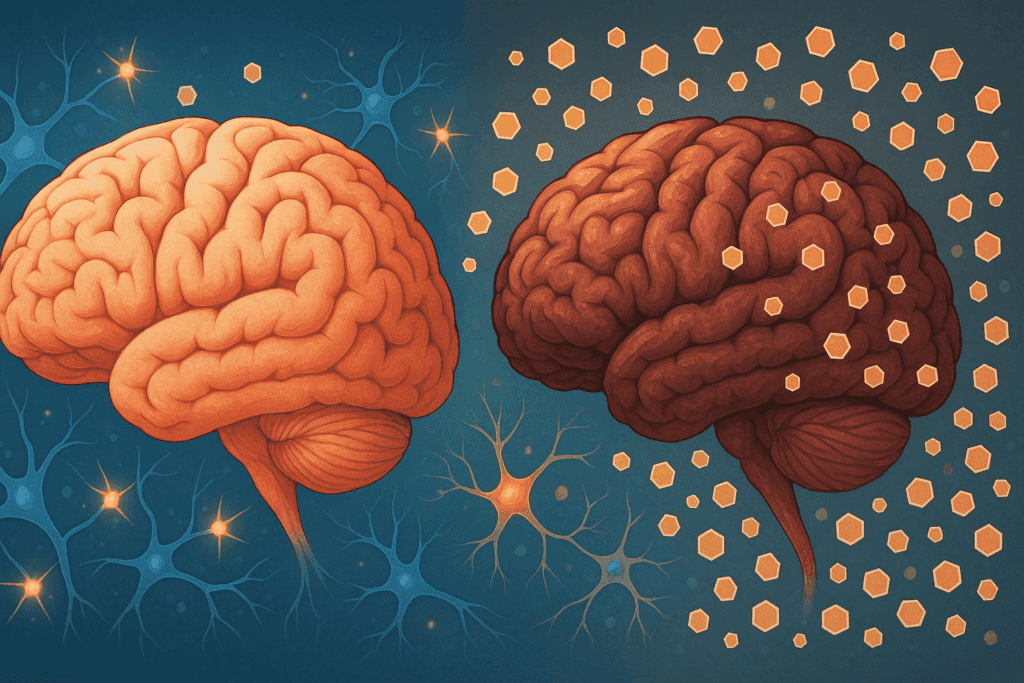
Understanding the Brain–Blood Sugar Connection
To appreciate the full value of the best mushroom for blood sugar support, one must first understand the critical relationship between glucose and brain function. The human brain, although comprising just about 2% of body weight, consumes nearly 20% of the body’s glucose-derived energy. Glucose is the primary energy source for neuronal activity, neurotransmitter production, and synaptic transmission. This means that even small fluctuations in blood sugar levels can have immediate and sometimes dramatic effects on mental clarity, memory, focus, and mood.
Hypoglycemia, or low blood sugar, can lead to symptoms like confusion, irritability, difficulty concentrating, and even temporary memory lapses. Conversely, chronic hyperglycemia, common in poorly managed diabetes, is associated with systemic inflammation, oxidative stress, and microvascular damage—all of which can impair cognitive performance and accelerate the progression of neurodegenerative diseases like Alzheimer’s. Indeed, Alzheimer’s is increasingly referred to as “type 3 diabetes” in scientific literature due to the profound insulin resistance observed in the brains of affected individuals.
In this biochemical context, regulating blood sugar is not just about preventing diabetes—it’s also about safeguarding mental acuity, emotional stability, and long-term cognitive resilience. This makes interventions that simultaneously target glucose balance and brain health particularly valuable, which is exactly where certain mushrooms have begun to show enormous promise.
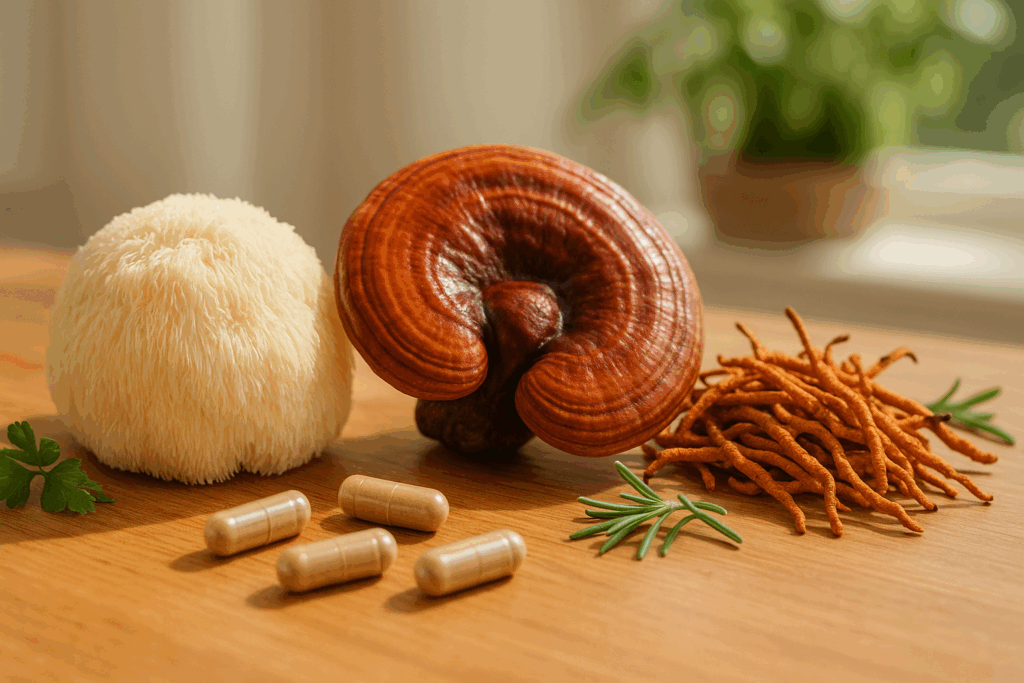
The Role of Functional Mushrooms in Modern Health
The past decade has seen a surge in the popularity of functional mushrooms, driven largely by their ability to confer a range of benefits without the side effects commonly associated with synthetic pharmaceuticals. The best mushrooms for diabetes and cognitive enhancement are not only rich in essential nutrients like B-vitamins, selenium, and zinc, but they also contain unique bioactive compounds that exert adaptogenic, anti-inflammatory, and neuroprotective effects.
For example, Lion’s Mane mushroom (Hericium erinaceus) is widely studied for its capacity to stimulate Nerve Growth Factor (NGF) production in the brain, a protein crucial for the growth, maintenance, and survival of neurons. In parallel, Reishi (Ganoderma lucidum) has shown promise in reducing blood sugar levels and improving insulin sensitivity in both animal and human studies. Cordyceps (Cordyceps militaris) is another strong candidate, known for its energy-boosting and immune-modulating effects, with emerging evidence suggesting that it may help modulate blood glucose levels via improved cellular metabolism.
These mushrooms are classified as nootropics—substances that enhance cognitive function—precisely because they work at multiple levels. Unlike isolated pharmaceuticals that target a single receptor or enzyme, functional mushrooms act in synergy with the body’s internal systems, creating a more balanced and sustainable approach to wellness. Their dual-action on brain function and metabolic health positions them uniquely in the pantheon of natural interventions.
How Stable Blood Sugar Supports Cognitive Function
The human brain operates optimally within a narrow range of blood glucose concentrations. When levels deviate from this range—either rising too high or falling too low—cognitive performance tends to suffer. High blood sugar levels can damage the blood-brain barrier, promote neuroinflammation, and reduce hippocampal volume, a brain region vital for learning and memory. Over time, this creates fertile ground for cognitive impairment and accelerates the onset of neurodegenerative diseases.
On the flip side, having stable blood sugar levels contributes to better memory consolidation, enhanced executive function, and improved mood regulation. Research has shown that individuals with well-managed glycemic control demonstrate superior performance in tasks requiring attention, short-term recall, and problem-solving abilities. This is particularly important for people with insulin resistance, prediabetes, or type 2 diabetes, as these conditions can subtly undermine cognitive efficiency long before they result in overt symptoms.
This is where the best mushroom for blood sugar support becomes a game-changer. By aiding in glycemic regulation through mechanisms like insulin sensitization, delayed carbohydrate absorption, or enhanced mitochondrial function, these mushrooms create a more stable internal environment. This, in turn, reduces cognitive volatility and fosters mental resilience—a critical asset in today’s stress-laden world.

Lion’s Mane: The Best Mushroom for Blood Sugar and Brain Health
Among all functional mushrooms, Lion’s Mane stands out as perhaps the best mushroom for blood sugar support that also confers significant cognitive benefits. Native to North America, Europe, and Asia, this white, shaggy mushroom has been used in traditional Chinese medicine for centuries to support the spleen and fortify the brain. Modern research now confirms that these ancient practices were onto something profound.
Lion’s Mane contains two unique compounds—hericenones and erinacines—that have been shown to stimulate the synthesis of Nerve Growth Factor (NGF), a molecule essential for the development and survival of neurons. Several clinical studies have demonstrated improvements in cognitive function, especially in older adults with mild cognitive impairment, following consistent supplementation with Lion’s Mane extracts. But its benefits don’t stop at the nervous system.
In the realm of blood sugar regulation, Lion’s Mane has shown promise in enhancing insulin sensitivity, reducing fasting glucose levels, and even regenerating damaged pancreatic beta cells in animal models. Its anti-inflammatory and antioxidant properties further protect against the oxidative stress associated with hyperglycemia. In this way, Lion’s Mane doesn’t merely offer a siloed benefit—it integrates neurological and metabolic health into a unified framework.
As a supplement, Lion’s Mane is generally well-tolerated and is available in capsules, powders, and tinctures. For those managing conditions like type 2 diabetes or simply seeking to maintain optimal mental performance, incorporating Lion’s Mane into a daily regimen could offer a safe, evidence-based strategy for long-term wellness.
Reishi and the Best Mushroom Supplement for Diabetes Management
Reishi mushroom, known scientifically as Ganoderma lucidum, has earned the moniker “the mushroom of immortality” in traditional Eastern medicine, and not without reason. Its adaptogenic qualities, which help the body resist stress and restore internal balance, have made it a staple in holistic health circles. In the context of metabolic and cognitive health, Reishi is increasingly being investigated as one of the best mushrooms for diabetes due to its ability to influence insulin pathways and reduce systemic inflammation.
One of the most compelling findings about Reishi is its polysaccharide content—specifically beta-glucans—which have been shown to lower blood glucose by enhancing insulin sensitivity and delaying glucose absorption in the intestines. Furthermore, triterpenoids found in Reishi exert lipid-lowering and anti-inflammatory effects, both of which are vital for managing type 2 diabetes and preventing cardiovascular complications commonly associated with it.
Cognitively, Reishi may not be as potent as Lion’s Mane in terms of direct neurogenesis, but its indirect contributions are equally valuable. By reducing cortisol levels, mitigating oxidative damage, and promoting better sleep quality, Reishi supports a holistic mental wellness profile. Given the well-documented link between chronic stress, poor glycemic control, and cognitive decline, Reishi’s adaptogenic support becomes a crucial aspect of integrative care.
For individuals seeking the best mushroom supplement for diabetes that doesn’t compromise cognitive vitality, Reishi offers a gentle yet powerful option. Available in various forms—from powdered teas to encapsulated extracts—Reishi can be integrated into almost any wellness routine with minimal risk and broad-spectrum benefits.
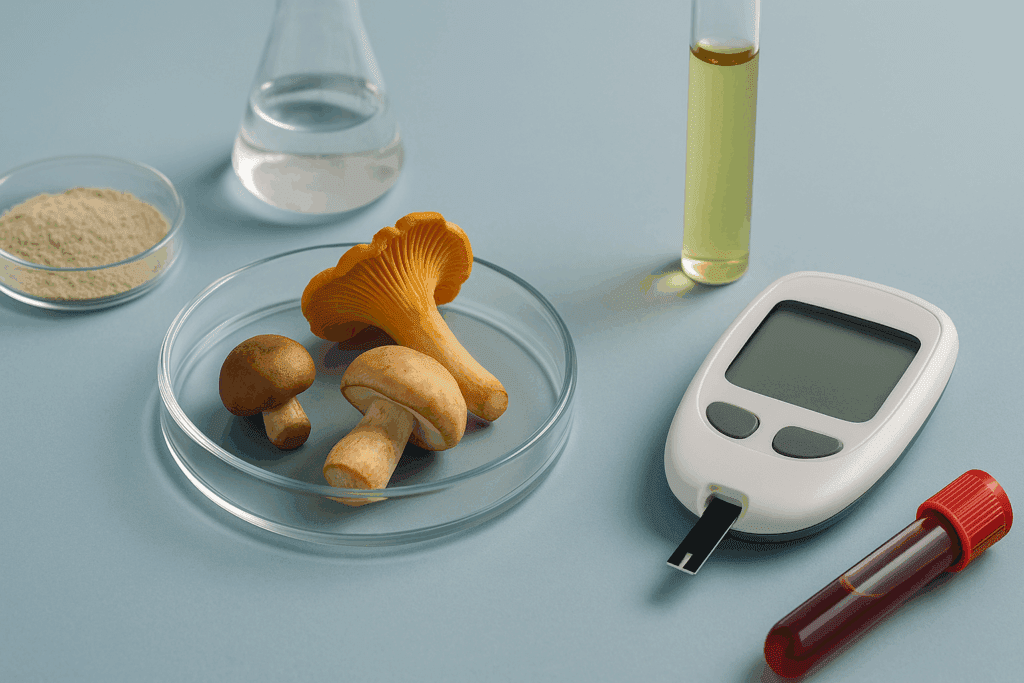
Do Mushrooms Lower Blood Sugar? The Evidence So Far
The question “do mushrooms lower blood sugar?” is no longer a matter of speculation but one of emerging scientific consensus. Multiple animal and human studies have indicated that certain mushroom species do indeed have hypoglycemic effects, although the magnitude and mechanism of these effects vary by species and preparation.
In animal models, Cordyceps militaris has demonstrated a capacity to improve glucose metabolism by enhancing mitochondrial efficiency and reducing systemic inflammation. In diabetic rats, supplementation with Cordyceps resulted in significantly lower fasting blood glucose levels, improved lipid profiles, and reduced markers of oxidative stress. While human trials remain limited, the consistency of animal results is encouraging and warrants further clinical exploration.
Clinical studies on Maitake (Grifola frondosa) have also shown that its D-fraction extract can modulate insulin and lower blood glucose levels, particularly when combined with other therapies. Meanwhile, Shiitake (Lentinula edodes), though better known for its cholesterol-lowering effects, also exhibits mild anti-diabetic properties through improved fat metabolism and glucose regulation.
It’s important to note that not all mushrooms are created equal in this context. Culinary mushrooms like white button or portobello may offer fiber and antioxidants but do not exhibit the same bioactive potency as medicinal varieties. Thus, while including a wide range of mushrooms in the diet can be generally beneficial, those seeking targeted support should focus on well-studied, high-potency species like Lion’s Mane, Reishi, and Cordyceps.
In sum, the question “do mushrooms lower blood sugar?” can be answered in the affirmative—particularly when specific species and extracts are used consistently within a comprehensive wellness strategy.
Neuroinflammation and Insulin Resistance: A Vicious Cycle
One of the less-discussed yet critically important intersections between cognitive health and blood sugar regulation is the role of neuroinflammation. Chronic inflammation in the brain—often fueled by elevated blood sugar and insulin resistance—disrupts neural communication, damages cellular structures, and impairs neuroplasticity. Over time, this fosters conditions such as brain fog, memory lapses, mood instability, and even the early stages of dementia.
Interestingly, insulin resistance is not confined to peripheral tissues like muscle and liver—it can also occur in the brain. This cerebral insulin resistance impairs glucose uptake in key cognitive regions like the hippocampus and prefrontal cortex, leading to both metabolic and functional deficits. It is a double-edged sword: high blood sugar promotes neuroinflammation, and neuroinflammation, in turn, exacerbates insulin resistance, creating a vicious cycle that erodes both cognitive and metabolic resilience.
Here again, the best mushroom for blood sugar support offers an elegant solution. Many medicinal mushrooms contain anti-inflammatory and antioxidant compounds that have been shown to reduce the expression of pro-inflammatory cytokines in the brain. By mitigating this inflammatory cascade, these mushrooms help to preserve neural integrity and restore insulin sensitivity—thereby breaking the feedback loop that leads to chronic disease.
The implications are profound: by supporting a healthier inflammatory profile, these mushrooms may not only slow the progression of metabolic syndromes but also provide a neuroprotective buffer against cognitive decline. This makes them invaluable tools for individuals navigating both blood sugar imbalances and the cognitive fog that often accompanies them.
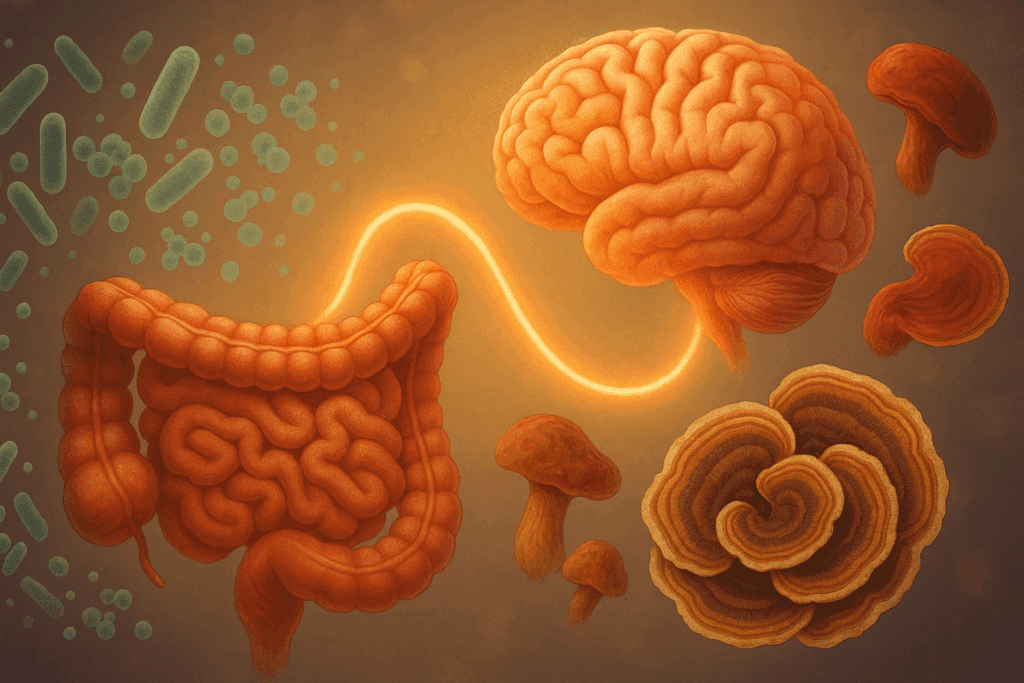
The Gut–Brain Axis and Mushroom Synergy
An emerging area of research that further validates the value of functional mushrooms is the gut–brain axis—a bidirectional communication network that links the gastrointestinal system to the central nervous system. This axis plays a pivotal role in regulating mood, cognition, immune response, and metabolic function. And it turns out, mushrooms are particularly well-suited to modulate this complex system.
Rich in prebiotic fibers like chitin and beta-glucans, mushrooms help to cultivate a more diverse and robust gut microbiota. This microbial diversity is associated with improved insulin sensitivity, enhanced nutrient absorption, and reduced systemic inflammation—all of which directly affect brain function. In fact, recent studies suggest that alterations in gut microbiota can influence the synthesis of key neurotransmitters like serotonin, dopamine, and GABA, thereby impacting mood and cognition.
Furthermore, some mushroom species—particularly Reishi and Turkey Tail—contain compounds that act as immunomodulators, helping to balance the gut’s immune response. This is critical for people with diabetes or prediabetic conditions, as chronic inflammation originating in the gut can easily extend to the brain, perpetuating cycles of cognitive decline and emotional dysregulation.
By promoting gut integrity, enhancing microbial diversity, and reducing systemic inflammation, mushrooms create a supportive foundation for both cognitive function and metabolic control. This synergistic action across multiple systems underscores why the best mushrooms for diabetes are also potent allies for brain health. Their capacity to influence the gut–brain axis makes them uniquely qualified for integrative health strategies.
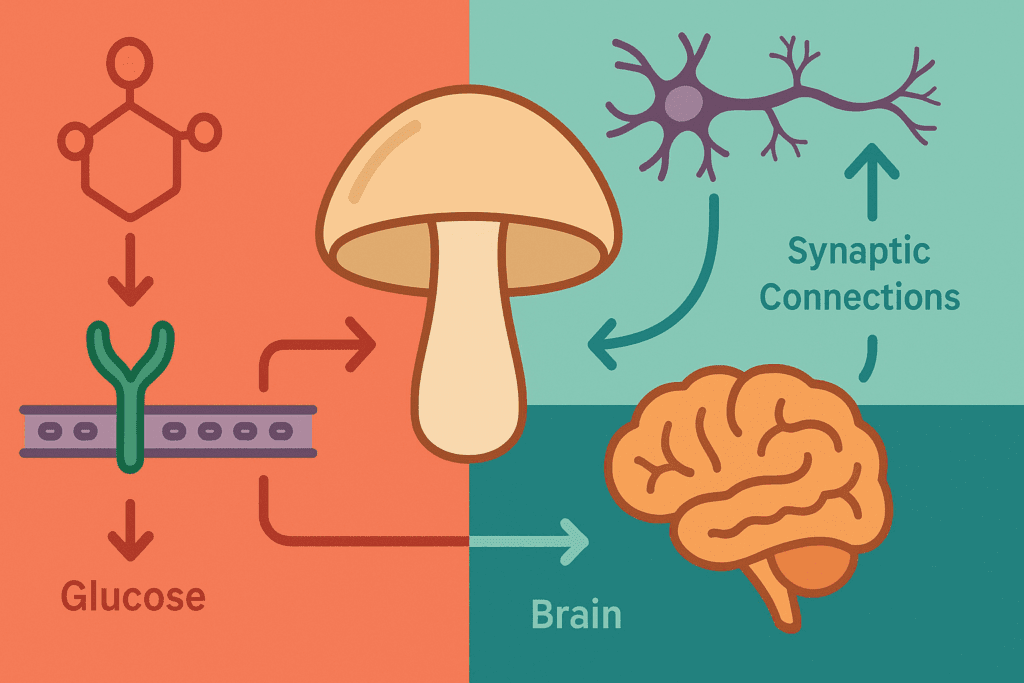
The Best Mushroom for Blood Sugar Support: Mechanisms of Action and Cognitive Gains
The best mushroom for blood sugar support does not operate through a single pathway; rather, it leverages a network of biological mechanisms to produce its beneficial effects. First and foremost is its influence on glucose metabolism. Many medicinal mushrooms contain polysaccharides that slow the absorption of sugars in the digestive tract, thereby reducing postprandial blood glucose spikes. This glycemic smoothing is crucial for preventing the microvascular damage that contributes to both cognitive and metabolic dysfunction.
Second, these mushrooms enhance insulin sensitivity by modulating signaling pathways such as PI3K/Akt and AMPK. Improved insulin signaling allows glucose to enter cells more efficiently, reducing circulating blood sugar levels and alleviating the energetic stress that often affects the brain during periods of insulin resistance. Some mushroom compounds even influence gene expression related to glucose transporter proteins, further optimizing cellular fuel use.
On the cognitive side, mushrooms like Lion’s Mane stimulate neurogenesis and synaptic plasticity through upregulation of growth factors like NGF and BDNF. This neurotrophic support is vital for memory formation, learning, and mood regulation. When combined with reduced oxidative stress and better glycemic control, the result is a powerful blend of mental clarity and metabolic efficiency.
Importantly, these benefits are not merely additive—they are synergistic. Stable blood sugar reduces cognitive fluctuations, while enhanced neuroplasticity supports better behavioral choices, stress resilience, and lifestyle adherence. This creates a virtuous cycle in which brain and body work in harmony, making the best mushrooms for diabetes far more than a glycemic aid—they become cornerstones of holistic vitality.
Clinical and Nutritional Guidelines for Incorporating Functional Mushrooms
For those seeking to integrate the best mushroom supplement for diabetes and cognitive enhancement into their daily lives, a few clinical and nutritional guidelines can help optimize benefits. First, quality matters immensely. Many over-the-counter mushroom products are made from mycelium grown on grain substrates, which contain fewer bioactive compounds than fruiting body extracts. Always look for third-party tested products that specify the percentage of polysaccharides and triterpenes.
Dosage is another consideration. Clinical studies on Lion’s Mane typically use doses ranging from 500 mg to 3,000 mg per day, depending on the extract concentration and intended outcome. Reishi and Cordyceps are often consumed in similar ranges, though some individuals may require titration due to sensitivity or interaction with medications, especially anticoagulants or blood pressure drugs.
Mushroom supplements can be taken with meals to enhance absorption and reduce the likelihood of gastrointestinal discomfort. For cognitive effects, consistent daily use over several weeks is usually necessary, as neurogenesis and receptor sensitivity require time to adapt. Pairing mushroom intake with other lifestyle interventions—such as a whole-food, low-glycemic diet and regular exercise—can further enhance outcomes.
Finally, while mushrooms are generally safe, it is always advisable to consult with a healthcare provider before starting any new supplement regimen, particularly for individuals with chronic conditions, autoimmune disorders, or who are pregnant or breastfeeding. The goal is to create a personalized, sustainable plan that supports both blood sugar stability and cognitive excellence.

The Role of Diet and Lifestyle in Maximizing Mushroom Benefits
While mushrooms offer a potent tool for managing both blood sugar and cognitive health, their effectiveness is magnified when embedded within a broader lifestyle strategy. Diet, sleep, exercise, and stress management all interact with the same metabolic and neurological pathways that mushrooms influence. Neglecting these pillars can dampen the impact of even the most powerful mushroom supplement.
For example, a Mediterranean-style diet rich in leafy greens, legumes, healthy fats, and low-glycemic fruits can provide the essential nutrients needed to support insulin sensitivity and neuroplasticity. This diet also complements the prebiotic properties of mushrooms, fostering a gut microbiota that enhances the gut–brain axis. Limiting processed carbohydrates, sugary snacks, and excessive alcohol can further reduce glycemic volatility and support mental clarity.
Physical activity, especially resistance training and aerobic exercise, is another crucial component. Exercise improves insulin sensitivity, enhances mitochondrial function, and stimulates the release of brain-derived neurotrophic factor (BDNF), much like medicinal mushrooms do. Combining exercise with mushroom supplementation can create a powerful one-two punch for metabolic and cognitive resilience.
Sleep is equally important. Chronic sleep deprivation disrupts glucose metabolism, elevates cortisol levels, and impairs memory consolidation. Mushrooms like Reishi can promote restful sleep, supporting recovery and mental performance. Stress management techniques such as mindfulness meditation, deep breathing, and adaptive coping also intersect with the physiological domains influenced by functional mushrooms.
In this integrative framework, mushrooms are not a magic bullet but a catalyst—one that works best when supported by consistent, health-promoting behaviors. This holistic approach ensures that the benefits of the best mushroom for blood sugar support are fully realized across all domains of life.
Emerging Research and Future Directions
The landscape of mushroom research is rapidly evolving, with new findings emerging that shed light on their multidimensional health effects. Studies are now exploring the epigenetic impact of mushroom compounds—how they influence gene expression related to inflammation, metabolism, and cognitive function. This opens the door to potential applications in personalized medicine, where specific mushroom strains could be matched to an individual’s genetic and metabolic profile.
Another promising frontier is the use of mushroom-derived nanocarriers for targeted drug delivery. By encapsulating bioactive mushroom compounds in nano-lipid particles, researchers are improving their bioavailability and allowing for more precise delivery to organs like the liver, pancreas, or brain. These innovations could make mushroom-based therapies more effective and accessible for those with chronic conditions like type 2 diabetes or early-stage Alzheimer’s.
Functional foods incorporating mushroom extracts are also becoming more sophisticated. From blood-sugar balancing coffees and protein powders to cognitive-enhancing snack bars and adaptogenic tonics, the commercial sector is responding to consumer demand with an array of innovative, science-backed products. While these formulations offer convenience, it’s crucial that they are guided by rigorous quality standards and transparent sourcing.
Finally, future clinical trials are needed to better understand the long-term effects of mushroom supplementation, optimal dosages, and potential interactions with conventional medications. As more funding and academic attention are directed toward this field, the credibility and applicability of mushrooms in mainstream health care will only continue to grow.
Frequently Asked Questions About Cognitive Health and Functional Mushrooms
1. What makes the best mushroom for blood sugar support effective in enhancing mental stamina throughout the day?
The best mushroom for blood sugar support offers more than glycemic stability—it helps maintain a steady supply of brain energy, which reduces cognitive fatigue. By preventing the highs and lows of glucose spikes, these mushrooms help create a consistent mental rhythm. This can be especially helpful for people who engage in mentally demanding tasks or experience afternoon energy crashes. Moreover, the adaptogenic compounds in mushrooms like Lion’s Mane and Reishi interact with cortisol pathways, helping reduce mental stress and increasing focus. Over time, this leads to improved cognitive endurance and fewer distractions caused by erratic blood sugar fluctuations.
2. How do the best mushrooms for diabetes fit into the daily routines of working professionals or students?
The best mushrooms for diabetes can be seamlessly added to coffee, protein shakes, or even snacks, making them ideal for individuals with busy lifestyles. For example, mushroom-infused coffee blends or powdered extracts can be consumed in the morning to provide sustained energy without the crash associated with sugary breakfasts. Lion’s Mane, in particular, has been shown to support neuroplasticity, making it beneficial for learning, task-switching, and memory retention—key requirements for both students and professionals. Because these mushrooms also promote metabolic efficiency, they help manage stress-induced blood sugar surges that are common in high-pressure environments. As a result, they become practical tools for cognitive and metabolic support in everyday settings.
3. Are there any social or psychological benefits linked to the use of mushroom nootropics in people managing type 2 diabetes?
Yes, emerging evidence suggests that mushroom nootropics can improve emotional regulation, which is often challenged in individuals managing type 2 diabetes. Chronic fluctuations in blood sugar are associated with mood swings, irritability, and even depressive symptoms. By stabilizing glucose levels and reducing neuroinflammation, the best mushroom for blood sugar support indirectly supports mood stability. Additionally, the psychological benefit of feeling more mentally clear and in control of one’s health can significantly improve self-confidence and reduce health-related anxiety. Over time, these social and emotional improvements may contribute to better adherence to treatment plans and healthier interpersonal relationships.
4. What makes the best mushroom supplement for diabetes stand out compared to traditional herbal remedies or synthetic medications?
Unlike synthetic medications, which often target one physiological mechanism, the best mushroom supplement for diabetes offers multi-system support with minimal side effects. Medicinal mushrooms contain compounds that not only regulate blood sugar but also influence immune function, cognitive performance, and even sleep quality. While traditional herbs like cinnamon or fenugreek also support glycemic control, mushrooms bring added benefits through their neuroprotective and anti-inflammatory properties. Additionally, mushroom supplements often exhibit better bioavailability and stability when taken as dual-extracts, which makes them suitable for long-term use. Their broader health impact makes them a more integrative option, particularly for people seeking holistic wellness strategies.
5. Can mushrooms that lower blood sugar enhance exercise recovery and metabolic efficiency?
Yes, mushrooms like Cordyceps militaris are known to boost ATP production and oxygen utilization, enhancing both performance and recovery in physically active individuals. When blood sugar is well-regulated, muscles receive a steady energy supply, which prevents fatigue and supports quicker recovery. Furthermore, the anti-inflammatory properties of these mushrooms can reduce muscle soreness and joint inflammation post-exercise. This makes them particularly beneficial for individuals with metabolic syndrome or prediabetes who are incorporating physical activity into their health regimen. By enhancing insulin sensitivity, these mushrooms improve glucose uptake into muscle cells, increasing energy efficiency during workouts and recovery phases.
6. How can the best mushroom for blood sugar support be used as a preventive strategy against age-related cognitive decline?
Preventive health strategies aim to address underlying risk factors before symptoms emerge, and the best mushroom for blood sugar support fits this model perfectly. Insulin resistance is a known precursor to neurodegenerative diseases like Alzheimer’s, and certain mushrooms counter this by improving glucose utilization in the brain. Their neurotrophic compounds help maintain synaptic density and support mitochondrial function, two processes that typically decline with age. Long-term use of these mushrooms may also reduce microvascular damage in the brain caused by chronic hyperglycemia. Incorporating them into one’s routine early in life could build neurological resilience and delay the onset of age-related cognitive impairment.
7. Do mushrooms lower blood sugar in ways that could interfere with existing medications?
While mushrooms do lower blood sugar through various mechanisms—such as increasing insulin sensitivity and slowing glucose absorption—they are generally safe when used responsibly. However, when taken alongside medications like metformin or insulin, there is a potential for blood sugar to dip too low. It’s important to monitor blood glucose levels closely when beginning any mushroom regimen and to consult a healthcare provider for personalized advice. Some mushroom extracts can also influence liver enzyme activity, which may affect the metabolism of other drugs. Therefore, understanding the interaction potential and tailoring dosages accordingly is crucial for individuals on prescribed treatments.
8. How do seasonal changes impact the effectiveness of the best mushroom supplement for diabetes?
Seasonal changes can influence both blood sugar regulation and cognitive clarity, making the consistent use of the best mushroom supplement for diabetes even more important. For example, during colder months, people tend to exercise less and consume more carbohydrate-heavy comfort foods, which can destabilize glucose levels. Simultaneously, reduced sunlight can lead to seasonal affective disorder (SAD), affecting mood and cognitive function. Mushrooms like Reishi and Lion’s Mane provide steady support during these fluctuations by modulating neurotransmitters and supporting metabolic equilibrium. Their adaptogenic qualities make them especially valuable during seasonal transitions when both mind and body are under increased stress.
9. Are there differences in efficacy between whole mushrooms and extract forms for supporting cognitive and blood sugar balance?
Yes, there are significant differences. Whole mushrooms contain fiber and nutrients beneficial for gut health, but their active compounds are less concentrated and often not easily absorbed. Extracts, especially dual-extraction types, concentrate the bioactive elements like beta-glucans and triterpenes, making them more potent and bioavailable. For someone targeting specific health goals like improved insulin sensitivity or enhanced memory, standardized extracts offer more reliable results. Additionally, extracts are easier to dose consistently, which is essential when using functional mushrooms as part of a structured health plan. That said, both forms can be beneficial depending on one’s goals, dietary preferences, and overall health status.
10. What future developments might influence how we use the best mushrooms for diabetes and brain health?
The future of mushroom-based wellness lies in personalized supplementation and biotech innovation. Researchers are exploring mushroom genomics to identify strains with optimal therapeutic profiles for different populations. Advances in nanotechnology may lead to mushroom compounds being delivered through targeted carriers, enhancing their absorption and reducing side effects. In addition, AI-driven platforms are beginning to match users with specific mushroom protocols based on genetic, metabolic, and lifestyle factors. As data on long-term effects accumulate, we may even see mushroom-based adjunct therapies become a standard part of preventive medicine, particularly in managing early-stage diabetes and preserving cognitive health. This evolving field holds immense promise for integrative and personalized healthcare.
The Best Mushroom for Blood Sugar Support: A Vital Tool for Cognitive Longevity
As we reach the conclusion of this exploration, it becomes clear that the best mushroom for blood sugar support is not merely a tool for managing diabetes or enhancing memory in isolation. Instead, it represents a vital intersection of two foundational pillars of health: metabolic regulation and cognitive vitality. In an age where both diabetes and neurodegenerative diseases are on the rise, having a natural, multifaceted agent that supports both domains is nothing short of revolutionary.
Mushrooms like Lion’s Mane, Reishi, and Cordyceps offer a compelling blend of bioactive compounds that nourish the brain, stabilize blood sugar, and protect against the silent, cumulative damage wrought by inflammation and oxidative stress. They operate not as blunt instruments but as finely tuned adaptogens—restoring balance, fostering resilience, and unlocking the body’s innate capacity for healing and optimization.
Whether you are navigating the challenges of prediabetes, striving for peak mental performance, or simply seeking a more harmonious approach to wellness, incorporating these functional mushrooms into your lifestyle offers an evidence-based, integrative pathway forward. By honoring the synergy between brain and blood sugar, we are not just addressing symptoms—we are cultivating the very foundation of long-term health.
As the science continues to evolve, one truth remains constant: the choices we make today profoundly shape our future vitality. Functional mushrooms, when used thoughtfully and consistently, offer not just a supplement, but a strategy—one rooted in both tradition and cutting-edge science. They are not a panacea, but a potent partner in our pursuit of a clearer mind, a steadier body, and a more vibrant life.
Further Reading :
Reishi and Cordyceps for Healthy Blood Sugar
Mushrooms that Improve Blood Sugar in Diabetes
Exploring Edible Mushrooms for Diabetes: Unveiling Their Role in Prevention and Treatment
